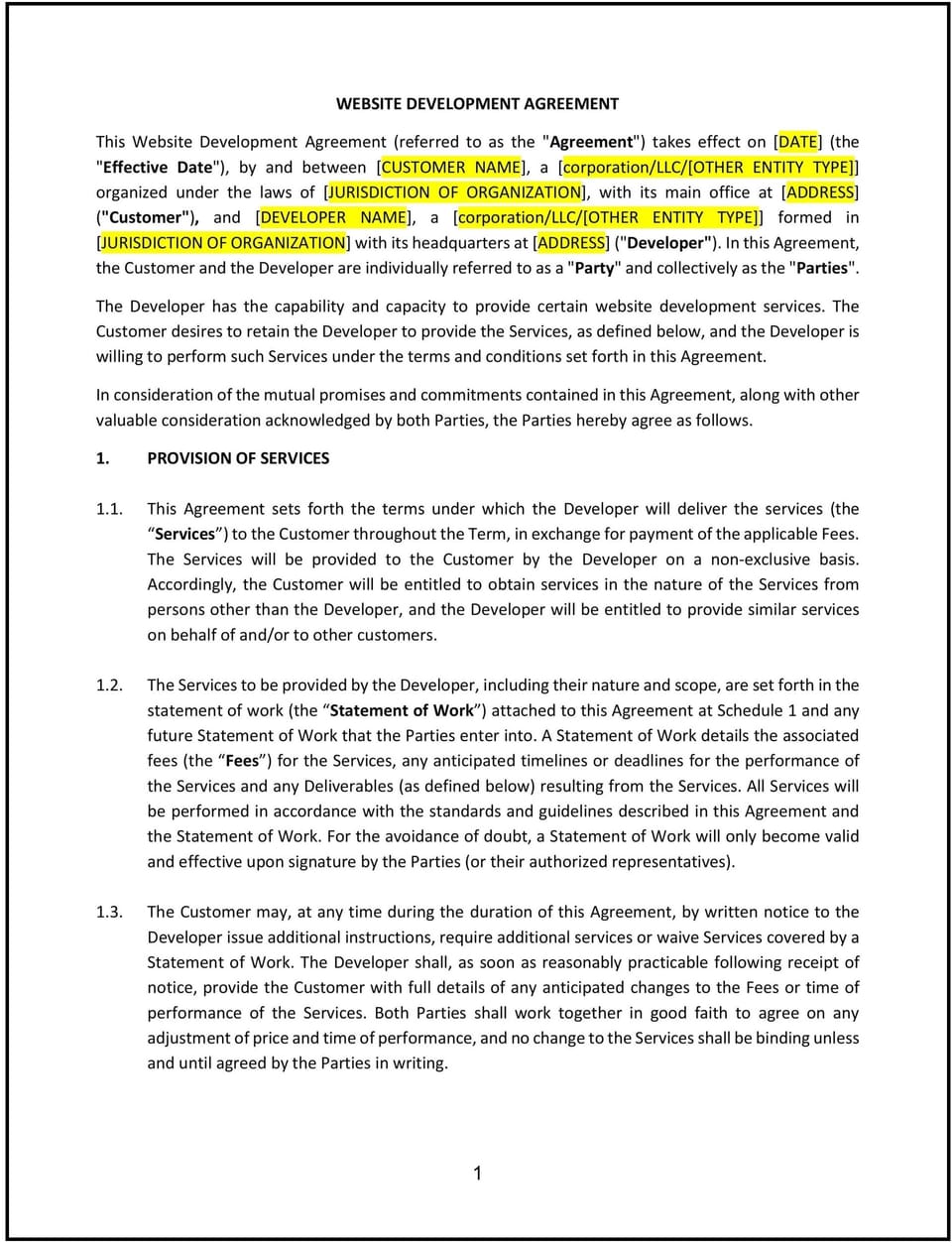Website Development Agreement (Kansas): Free template

Website Development Agreement (Kansas)
A Website Development Agreement is a legal contract between a client and a developer that outlines the terms and conditions for creating, designing, and launching a website. In Kansas, this agreement must comply with state laws regarding contracts and intellectual property. A well-drafted agreement ensures clarity, minimizes disputes, and protects the interests of both parties.
For example, a small business in Topeka might hire a web developer to create an e-commerce platform. A clear agreement specifies the scope of work, timelines, payment terms, intellectual property rights, and other critical details.
Tips for drafting and maintaining a Website Development Agreement in Kansas
- Identify the parties: Clearly specify the names, contact information, and roles of both the Client and the Developer.
- Example: “This Website Development Agreement is entered into by [Client Name], located at [Address], and [Developer Name], located at [Address].”
- Define the scope of work: Outline the specific tasks and deliverables the Developer will provide.
- Example: “The Developer agrees to design, develop, and launch a fully functional e-commerce website for the Client.”
- Specify the timeline: Define the project timeline, including milestones and deadlines.
- Example: “The project shall be completed within 90 days, with milestones due on [Dates].”
- Address payment terms: Specify the total cost, payment schedule, and any additional fees.
- Example: “The total cost of the project is $10,000, payable in three installments: 50% upfront, 25% upon completion of the design phase, and 25% upon final delivery.”
- Include intellectual property provisions: Specify ownership and usage rights for the website and its content.
- Example: “All intellectual property rights for the website shall transfer to the Client upon full payment.”
- Add revisions and approval processes: Outline the process for reviewing and approving deliverables.
- Example: “The Client may request up to three rounds of revisions for each deliverable.”
- Include confidentiality provisions: Protect sensitive information shared during the project.
- Example: “The Developer agrees to keep all proprietary information disclosed by the Client strictly confidential.”
- Outline governing law and jurisdiction: Ensure the agreement specifies that it is governed by Kansas law and identifies the appropriate courts for dispute resolution.
- Example: “This agreement is governed by the laws of the State of Kansas. Any disputes shall be resolved in the courts of [County], Kansas.”
- Include signatures: Both parties must sign and date the agreement to make it legally binding.
- Example: “IN WITNESS WHEREOF, the parties have executed this Website Development Agreement as of the date first written above.”
Frequently asked questions (FAQs)
Q: Are Website Development Agreements enforceable in Kansas?
A: Yes, Website Development Agreements are enforceable in Kansas if they are clear, reasonable, and comply with state contract laws. Courts may modify or invalidate agreements with vague or unfair terms.
Q: What happens if the Developer fails to meet deadlines in Kansas?
A: If the Developer breaches the agreement, the Client may pursue legal remedies such as monetary damages, contract termination, or specific performance, depending on the terms specified in the contract.
Q: Can intellectual property rights be transferred in a Website Development Agreement in Kansas?
A: Yes, intellectual property rights can be transferred, but the agreement must clearly define ownership and usage rights to avoid disputes.
Q: Does Kansas require written Website Development Agreements?
A: While oral agreements may be enforceable, written agreements are strongly recommended to ensure clarity and protect the interests of both parties.
Q: Can a Website Development Agreement in Kansas be modified?
A: Yes, the agreement can be modified if both parties agree to the changes in writing.
This article contains general legal information and does not contain legal advice. Cobrief is not a law firm or a substitute for an attorney or law firm. The law is complex and changes often. For legal advice, please ask a lawyer.


